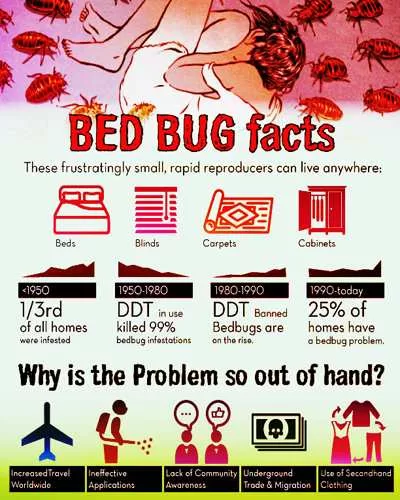Bed bugs aren’t just itchy, they can wreak havoc on your mind. Here’s how to fight back and reclaim your peace.
Beyond Bites: The Psychological Cost of Bed Bugs
Bed bugs are a growing menace, but their impact goes beyond itchy welts. These tiny bloodsuckers can wreak havoc on your mental well-being, causing anxiety, insomnia, and even PTSD-like symptoms.
A Nightmare Come True: The Emotional Trauma of Bed Bugs
Imagine waking up to find bloodthirsty insects feasting on you in your own bed. That’s the reality for many bed bug victims. This violation of your safe space can trigger a cascade of negative emotions:
- Paranoia: You become hypervigilant, constantly searching for bugs and fearing re-infestation.
- Anxiety: The constant stress of dealing with the bugs and the potential damage they cause can be overwhelming.
- Insomnia: The fear of being bitten at night can make it impossible to get a good night’s sleep.
- Social Isolation: Shame and stigma can lead you to withdraw from friends and family.
- Depression: The feeling of helplessness and the disruption to your life can lead to feelings of despair.
Bed Bugs Facts

Why Are Bed Bugs So Scary?
Several factors contribute to the psychological impact of bed bugs:
- Invasion of Privacy: They invade your most personal space, your bed, where you should feel safe and secure.
- Vulnerability During Sleep: They attack when you’re most vulnerable, while you’re asleep.
- Sense of Helplessness: Feeling like you can’t escape the bugs or control the situation can be extremely distressing.
- Social Stigma: The misconception that bed bugs are a sign of uncleanliness can lead to shame and isolation.
Who’s Most at Risk?
While anyone can experience anxiety from a bed bug infestation, some people are more susceptible to long-term mental health consequences:
- Those with Pre-Existing Mental Illness: People already struggling with mental health issues may find their symptoms exacerbated by the stress of an infestation.
- The Elderly and Isolated: Social isolation can worsen the psychological impact, especially for those who lack support networks.
- People Living in Poverty: Limited resources can make it difficult to afford professional treatment for both the infestation and the resulting mental health issues.
Breaking Free from the Bed Bug Blues
The good news: you don’t have to suffer in silence. Here are some steps to take back control of your mental health:
- Seek Professional Help: A therapist can help you manage anxiety, cope with trauma, and develop healthy coping mechanisms.
- Join a Support Group: Connecting with others who understand your experience can be incredibly validating and helpful.
- Educate Yourself: Learn about bed bugs, their life cycle, and effective treatment methods. Knowledge is power!
- Practice Self-Care: Prioritize your mental and physical well-being through healthy eating, exercise, and relaxation techniques.
Remember: Bed bugs are treatable. Don’t let them steal your peace of mind. Take action, seek support, and reclaim your life!
Bonus Tip: Advocate for stricter regulations and better public education to prevent the spread of bed bugs and reduce the stigma associated with infestations.

